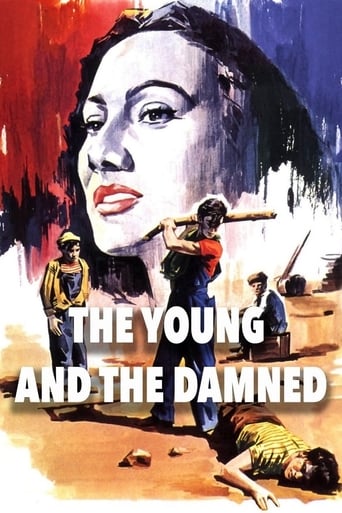Jackson Booth-Millard
I found this Mexican - Spanish language film listed in the book 1001 Movies You See Before You Die, it was rated very highly by critics, so I was hoping it would be another deserved entry like many others I've seen, directed by Luis Buñuel (Land Without Bread, Viridiana, Belle de Jour, The Discreet Charm of the Bourgeoisie). Basically, set in a Mexico City slum, this film shows the lives and misfortunes of a group of juvenile delinquents. Specifically it focuses on young Pedro (Alfonso Mejía), living in a world of poverty and the streets filled with crime and violence his morals are gradually corrupted an destroyed by the various characters' intimidation and cruelty. Also starring Estela Inda as Mother, Roberto Cobo as Jaibo, Jesús García Navarro as The Lost Boy, Miguel Inclán as The Blind Man, Alma Delia Fuentes as The Young Girl and Francisco Jambrina as The Principal. I will be honest and say that I could not keep up with everything going on whilst also reading subtitles, but I think to be there's not a lot I can say anyway, but it is a well observed film with some surreal moments, but a feeling of humanity throughout and many moments that get your attention, a worthwhile drama. It was nominated the BAFTA for Best Film from any Source and the UN Award. Very good!
bobsgrock
One of the earliest works of famed surrealist director Luis Bunuel's career, Los olvidados was an international hit primarily due to its portrayal of inner city Mexican children living on the brink of death due to immense poverty and crime. The plot focuses on the conflict between two young boys, Jaibo, a recently escaped juvenile delinquent, and Pedro, whose mother struggles to raise three other children and seemingly has no affection or attention left for her eldest. In following these characters, Bunuel cannot help but include some of his trademark surrealist imagery. One of the most famous involves Pedro throwing an egg at the camera as the liquid rolls down the lens. There is also an extended dream sequence in slow-motion chronicling one of the character's deep-seeded guilt and fear of his surroundings. For those who are not familiar with Bunuel, this is a good place to start. The film is accessible, moves along quickly, and encounters serious themes of how to deal with impoverished children and inner city crime in general. While not employing the kind of memorable techniques from later in his career that defines him today, this is still very much a Bunuel film, albeit a neorealist story with a twist of surrealism.
alxbarra
After watching this film several times and analyze it, all I have to say is this: ¿Why isn't this movie on the list of the best films ever made?Why isn't this movie consider a cult classic like The Seventh Seal, The 400 Blows or La Strada. In my opinion this movie is by far better than those films. Luis Buñuel's crude reflection of a reality that still happens in Mexico. Buñuel presents us a bunch of characters (specially kids) living at the streets, almost like animals surviving by instinct. I loved the fact that this movie doesn't set a solution, it is just a story about a generation of future criminals and murderers, and the story will keep going and going.these kids are The Forbidden Ones, the unborn ones.
dreamalladream
I like how Bunuel takes a common problem, injects it with dream like surrealism and give it a whole new meaning. In this film Bunuel addresses the problem of children living in poverty with poor or no family ties. We see through the children's eyes, what it's like to live on the streets in big City. Without proper role models, the children turn to El Jaibo who has just escaped from reform school. One of my favorite scenes is when Pedro breaks the 4th wall by throwing an egg at the camera. The egg is indeed on our faces.Unfortunately, sixty years later, this film is still relevant to problems children face today.


